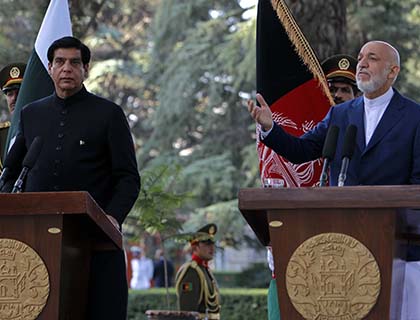In a recent meeting in Kabul, President Hamid Karzai and Prime Minister Raja Parvez Ashraf of Pakistan agreed to work jointly in order to promote regional peace and stability. While, emphasizing on maintenance of friendly and cordial relation, they renewed their long-lasting claim of commitment to eliminate terrorism in all its forms and manifestations
. As usual diplomatic gesture, they once again promised to work together in various spheres such as security, development, transit trade, mining, and energy. Their remarks also vividly explained that peace and reconciliation process should be led by Afghan government.
President Karzai thanked Mr. Parvez Ashraf on what he called measures held by Islamabad in support of the Afghan peace process, including the public call on armed opposition groups to participate in the reconciliation process.
Meanwhile, they did not openly put down controversial issues, like ambiguous rocket firings to the eastern parts of the country and possible hideouts of terror groups like that of Haqqani network in tribal agency areas, and etc. instead, economic issues were much highlighted particularly, TAPI gas pipeline.
Under the flashlights of cameras, they both kept smiling and squeezing each other's hands, but the question is, "Can those smiley faces shake the present wall of suspicion between Islamabad and Kabul?" Needless to say, Pakistan's spy agency during the Zia ul Haq regime was the main supporter of Taliban regime along with CIA. It is the reality that civil and military officials confess it. It was one of first countries who recognized the so-called Emarat-e-Islami.
Many Pakistani analysts argue that Pakistan did what perhaps any other would have done if had similar situation. Continuous instability and uncertainty in its in neighbor could prove consequential. Millions were forced to migrate and they generally settled down across Pakistan.
In such a situation, it must have done something to manage the situation and control the fallout of violence and instability in its neighboring country. Because, right after the fall of last communist President, Dr. Najib, Afghanistan was left in the hands of competing Mujaheedin groups who generally had no political and administrative experience in their background. Most of them did have higher education and stepped on the spiraling stairs of power only through weapons' tips and bullets. But meanwhile they were dexterous and cruel fighters.
They fought against Red Army for years and enjoyed mouth-watering cash of Islamic countries, particularly Gulf ones, as well as diplomatic and weaponry supports from Western allies. Their initial aim was also just to force out occupiers, and they never thought on how to manage the fallout of central power vacuum.
Indeed, it is a long way to move from the objective of mere toppling of enemy to establishment of a functional government. Indubitably, Mujaheedin groups had similar situation. What they pondered on least was establishment of an effective and national government. With the growing possibility of their victory against regime of Dr. Najib, murmurings started on how to manage a war-torn and comprehensively damaged country?
There is no information how the concept crept in among Mujaheedin leaders, but it is widely possible that their supporting nations played role. That is why we can see that a council formed in the Peshawar of Pakistan to decide about the destiny of Afghanistan.
The council was formed exactly when Mujaheedin were avariciously trying to grasp power with all cost. There was no potential power to force them join hands and develops a coalition government. The only aim of Western countries was to deal blow to USSR and prevent its reach to Indian oceans. The collapse of the USSR and its military retreat from
Afghanistan brought a lasting relief. They did not care about the situation in the country because nobody ever thought it would change into another threat to global peace and security.
In that it was assumed that only major countries with high military and destructive technology can put the world in threat, not a small, poor and backward country like Afghanistan. It was not assumed that it can be changed into hideout of the most dangerous terror network that will fight modernity in all its forms and manifestations. So, they withdrew and only ensured that their sophisticated weapons should be moved out or destroyed in fear falling to hands of irresponsible groups.
Co-current with heir pull out, Afghanistan was left in the hand of mercy. Pakistan which played great role in training and equipping Afghan Mujaheedin during Soviet era, tried to lobby them and establish an Islamabad favorite government in Kabul. The efforts did not work as rivaling groups was not able to defeat one another and take the situation under control.
Taliban stood out as an alternative to rout others and establish a hard-line Islamic government which would not endanger the security of Pakistan, rather work as hub to attract other hardliners inside Afghanistan. Pakistan military establishment supported Taliban and its support pushed up to peak of power.
But 2001 was turning point. Islamabad under the pressure joined US-led military struggle to rout Taliban regime. Since, Islamabad held several operations aimed to eliminate the shelters of Taliban and other insurgent groups inside the country, but meanwhile it is claimed that Taliban still maintain linkage with older friends.
On occasions, Kabul top officials, including President Karzai, have talked about "cross border" attacks. They also blamed their counterparts of inactivity against Haqqani network which is responsible for various high profile targeted killings.
On other hand, Islamabad redirects similar criticism against Kabul and blames Kabul for inefficiency and inability to restore peace and instability which has also destructive effects on Pakistan too. Amidst, such suspicion and irritation, can both countries join hands and develop a friendly relation with each other? Ostensibly, it is early to judge because the post-2014 process remains worrisome. And it is not clear how Islamabad may approach after the withdrawal of foreign security forces.

